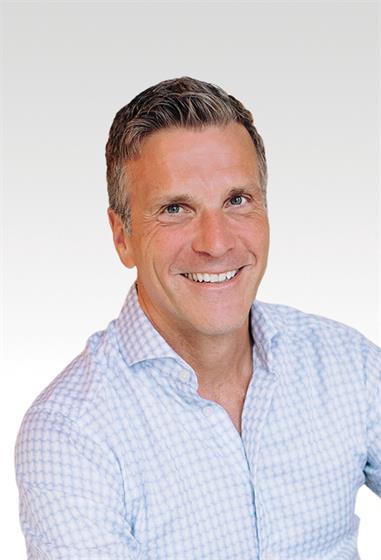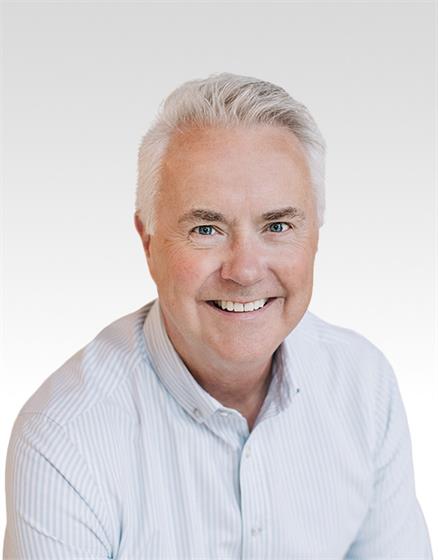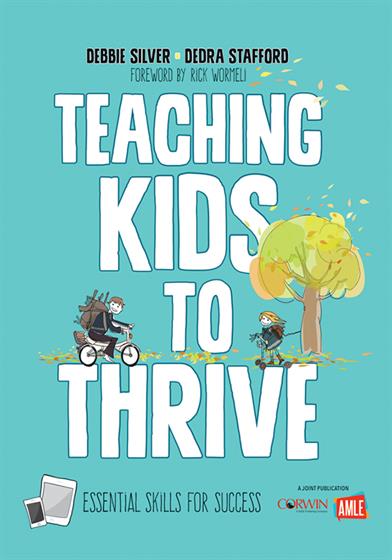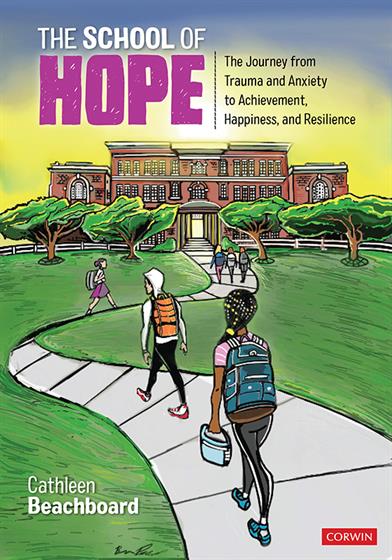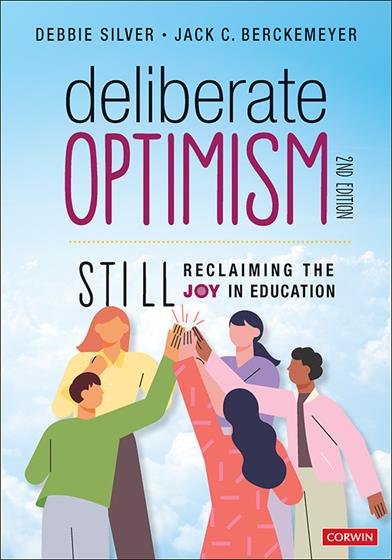Series 5 Leaders Coaching Leaders Podcast
[00:00:00.00] [MUSIC PLAYING]
[00:00:00.81] ANNOUNCER: Welcome to Corwin's Leaders Coaching Leaders
Podcast with host Peter Dewitt. This podcast is from education leaders for
education leaders. Every week, Peter and our guests get together to share
ideas, put research into practice, and ensure every student is learning, not by
chance, but by design.
[00:00:20.04] TANYA GHANS: Peter, is this season 5?
[00:00:22.69] PETER DEWITT: It is season 5. Isn't that crazy?
[00:00:25.18] TANYA GHANS: Cannot believe it. Well, I'm grateful for how quickly
this comes back around. And we are really starting season 5 off with a bang.
[CHUCKLES]
[00:00:36.34] PETER DEWITT: Yes, we are.
[00:00:37.81] TANYA GHANS: We have, really, the one and only Debbie Silver.
For audience members who know anything about the psychologist Martin Seligman,
he's like the father of positive psychology. Debbie is his educator
counterpart, if you will. Hailing out of Texas, seriously sought after
presenter on all kinds of topics and education, Debbie always brings so much data
and realism to the table.
[00:01:09.43] And she does not miss in this episode. She has a new book
coming out, Deliberate Optimism-- it's a second edition-- Still Reclaiming The
Joy In Education. And this conversation is going to go into that and many more
things. What I really like about this book and part of this conversation is how
she's framed these four things that educators can do to really boost their
deliberate optimism practice.
[00:01:40.48] And that she just roots everything in keeping it real about
what's happening on the ground for educators, and using that as her springboard
for saying why deliberate optimism makes sense, it works, and always it's good
for us to revisit this as often as we can because it can be so easy to lose
optimism. As much as we need it, it can be so easy for it to fade.
[00:02:03.43] PETER DEWITT: Yeah, we have a lot working against us when it
comes to being optimistic. And I like that Debbie describes herself as a
speaker, author, and humorist. And she is funny. I've known Debbie for 10
years. I think I met her 10 years ago. And I believe that she has a really good
way of using humor to get to the heart of a point. And that takes a special
balance because sometimes if you try to use humor to get to a point, you can come
off sarcastic.
[00:02:34.33] Debbie has this humorous way of doing it, but she is very
authentic. And I think listeners are going to really hear that through the
conversation. And you know, when you describe yourself as a humorist, I want to
make sure that it doesn't get lost that she's also making sure that she's based
in research.
[00:02:53.80] TANYA GHANS: Yep, yes.
[00:02:54.49] PETER DEWITT: We're here to talk about things like
self-efficacy and collective efficacy. So she is very much an educator. And
this was a really fun conversation for me.
[00:03:05.89] TANYA GHANS: Really fun. I mean, Debbie 1,000% embodies the
optimism she espouses and touts. She lives it, walks it, breathes it, all of
it. So listeners, this is a fantastic way to open season 5. We know you are
going to really enjoy it, and we will see you on the other side.
[00:03:27.09] [MUSIC PLAYING]
[00:03:30.81] PETER DEWITT: Debbie Silver, welcome to the Leaders Coaching
Leaders Podcast.
[00:03:34.20] DEBBIE SILVER: Oh, thank you. It's good to be here.
[00:03:37.86] PETER DEWITT: I love seeing you and I really enjoy when we
get-- the times we get together are few and far between. So the fact that we
can do this is kind of just really nice to be able to catch up.
[00:03:48.75] DEBBIE SILVER: They're fun.
[00:03:50.53] PETER DEWITT: So you know, you have-- when people get on your
website or when they're reading your books, you've got books like Delivered
Optimism, something that's going to a revised edition that's going to be coming
out. I want to talk about that for sure. But then when I was on your website, I
also saw things like Reclaiming Joy. And one of the ideas that kind of came up
in mind is, over the past few years, all we've heard a lot about is COVID
learning loss, teacher shortages, increase in burnout, social and emotional
learning, well-being, all of those kind of things.
[00:04:29.37] And these are topics that you've actually been talking about
for a lot longer than just COVID being around. So I find the work that you're
doing, it has always been important, but it's even more important now. So I
guess the question is, how do people reclaim joy or how do they become
optimistic at a time when it seems like anxiety and things like depression are
at an all-time high?
[00:04:56.19] DEBBIE SILVER: And you couldn't be more right. I mean, it is
so challenging. But we have to shift our focus. You know, Deliberate Optimism,
we chose that title for a reason because we think it is intentional. And it
doesn't mean this pharmaceutically induced, you know, I'm so happy. Just an
certainly not toxic positivity, which is that contrived kind of merriment that
sometimes subverts talking about the deeper issues.
[00:05:25.54] And I think that's where we're kind of missing the boat on
that in some of our schools. It's like teachers do hard things. Well, yeah, we
do, we always have. But that doesn't mean that we don't talk about some of the
deeper issues. So in Deliberate Optimism, it's more like a realistic optimism.
It's yes, there are problems, everything you mentioned while ago, all of that,
we can't disregard that. It's right in our face.
[00:05:53.13] But in Deliberate Optimism, we talk about, what are some
purposeful steps you can take to deal with that? And fretting is not one of
them. And I think the media-- because we have just lost it in the court of
public opinion right now. Everybody's wringing their hands, playing it and
ain't it awful? And it's cyclical. And it will bring us all down. So we've got
to say, just stop. Here's what we can do. And in Deliberate Optimism, we talk
about four things.
[00:06:23.19] We say, first of all, get accurate information. And I think
there's a great gap in trying to find that. The second is to control what you
can control. And I mean, everybody says that, but let's look at what that
really means. We can't control what the parents are doing at home. We can't
control what our state legislators are doing. I mean, we can write letters. We
can do things like that. But I think the immediacy is to look within our
system, within our schools and say, all right, what about this situation can I
control?
[00:06:57.60] And I am not going to let those things I cannot control
overwhelm me or overshadow the things I can do. So that's the real operative
thing that Deliberate Optimism is, getting a realistic view on, you know what?
Can't do anything about that. Can't stop COVID. Can't stop poverty. Can't stop
a lot of things that are happening. But what we can do is say, all right,
here's what I can control. Here's what I'm going to do about it. Here's how I'm
going to minimize those things that are outside of my parameters.
[00:07:33.27] I'm going to minimize their effect on me. I'm going to try to
figure out a way to walk around it and get to what I want to do. And then the
third is do something. Don't just sit around and, oh, my gosh, we've got
shortages. What are we going to do? It's just terrible in the public schools.
We've got to stop that. We've got to actually do steps forward because we all
know that. We have an inertia problem, I know I do. It's really hard for me to
get started on something.
[00:08:02.37] But man, once I'm going, it's hard to stop. And so it means
just put some things in place that you know will work, and then start talking
about our successes and celebrating those. And like, OK, we're maybe not where
we want to be yet, but we're this much further down the road. And then the
fourth one is just own it. And I'm huge into this, teachers, we've got to take
our power back. We have let other people come and tell us what's wrong with
education, what we're going to have to do, bla, bla, bla, bla, bla.
[00:08:35.32] And the people best qualified to make those decisions are
sitting in classrooms, standing in classrooms. And we need to take our power
back and go, look guys, we didn't make this up. We have learned. We have
studied. We constantly try to improve ourselves. So let's take our integrity
and our power back. And quit fretting. And quit taking this defensive posture.
And I don't know, I'm just ready for us to say we own it. We'll take care of
it. I'm sorry, I just--
[00:09:06.56] PETER DEWITT: No, no, no, no, no, those four are fantastic.
And in my head, at the same time you're talking, I'm thinking like, bing, bing,
bing. There's so much going off. One of the things that you made me think about
is when you talked about the media, during COVID, we would turn on the TV in
the morning and watch a morning news show, and they were talking about COVID
deaths like they were reporting on baseball scores. And it's not that I didn't
want to know what was happening. I mean, I was definitely invested in understanding
what was happening.
[00:09:38.46] But I realized during that time that I just couldn't process
all the information that was coming at me. And we decided, a couple of years
ago, to just stop watching the morning news. And we'll listen to music. We'll
listen to classical music. We'll listen to the radio in the morning because
it's just much more peaceful. And when I'm on the road in a hotel, I do not
watch the news in the morning. I listen to music or I just have silence because
we do need to understand what we-- it goes with what you just said, which is
what do we control. We control how much of that we're taking in.
[00:10:14.31] DEBBIE SILVER: Right.
[00:10:14.82] PETER DEWITT: And it is having a negative impact on us leaving
our door because when you hear all that negative news. And then you leave your
house to go to work, you do start off at a disadvantage.
[00:10:26.67] DEBBIE SILVER: You do
[00:10:27.66] PETER DEWITT: And I think that you can find-- I mean, you
said-- accurate info. There are places I can go to look for my accurate info
and get what I need from a news standpoint and then move on And not just be the
barrage of it. One of the things that you were also talking about is that
control thing. I remember sitting in a meeting. It was a three-hour meeting. In
the first 35 minutes, the group that I was with talked about things that they
didn't control.
[00:10:56.16] They just talked 35 minutes about-- and I was kind of timing
it and I didn't say anything. And I was there to talk about the implementation.
And they said, we just don't have any time to really focus on-- and I said, you
would have time if you didn't just spend 35 minutes talking about things that
you don't control. So what you're talking about is so important. And I wonder,
how do you get people to see that? Like, in your work, whether you're
presenting, coaching, whether you are writing a book, whatever you're doing,
how do you intentionally get them to see that?
[00:11:32.86] Because one of the things that I've started to see is that,
very often, people are quick to blame somebody else for what's happening, but
they don't see how they contribute to their own issues. And I just wonder, how
do you help them focus on that in the work that you're doing?
[00:11:50.33] DEBBIE SILVER: I think part of it is the way that we listen.
And granted, sometimes people just want you to listen. They just need to be
heard. And you've been an administrator and you know sometimes, with an angry
parent, they just need to vent. And I'm fine with that. All right, vent, go
ahead. But then after that's over, I'm going, OK, now we got that out of the
way. So every conversation we have from this point forward should be focused on
solutions.
[00:12:19.67] So we're not going to go back. We're not going to do like 35
minutes of-- it's like people getting on media and doing doomscrolling. And my
gosh, you just get worse and worse. And like you said, you leave in the morning
thinking, what's the point? And my point about optimism is that you have to
believe that what you do is important and that you're making a difference. And
if you don't believe that, then we don't need you right now in education
because we need people focused on, all right, I may not can control everything,
but I can control this thing.
[00:12:55.24] I may not can call 10 parents tonight, but I can call one. So
we start talking and you asked me the question, how do you get people to focus
on that? And when I'm coaching, I'm saying, all right, and you know what? That
sounds like something over which you have little control. And they're like,
well, no. And I'm like, OK, so we're going to put that aside. What is something
you can control? Because here's the two things you can always control-- your
choices and your effort, and those are the keys to everything.
[00:13:26.21] So even if you can't control what's happening to you, you
control how you take that in, how you choose to respond to that. And that's
very difficult. But to me, what we're lacking right now in the world, but
mainly in education, is compassion, is grace, is patience. You mentioned it
earlier when you said, oh, we're talking about learning losses. And I'm like,
I'm so sick of hearing that because what did we lose? I mean, the whole world
was affected by COVID.
[00:13:57.07] So what are you comparing us to? It's not fair to compare us
to five years ago because there was no pandemic, there was no shelter in place.
So stop that. Let's look at, where are we now? We're not where do we wish we
were, where should, where we ought to be. Where are we? And how do we move
forward from that point? And I think that realistic approach is what we have to
do with each other and we have to do as a collective body. And I want to go
back to something you said, your deimplementation book, which I talk about-- we
talk about in our book, we've got to get some stuff off the plates.
[00:14:34.00] If I were administrator, I would not put anything on teachers
plates until I took something off. So we've got these things that we've always
done. They're embedded in our culture, but are they helping? And that's my big
key now. When people are wanting to argue with me or going, but I was right,
they shouldn't have. And I'm going, OK, but that's not helping. And so that's
my big note when I'm talking to people. And I want to just go on and on.
[00:15:02.68] And I have a point and you can't say I'm wrong. I'm going, but
what you're-- you're not helping. This is not helping. How can we help you feel
better so that you do your best job, so that you feel empowered, self-efficacy,
that you take your control back? And that's what we're lacking in schools, is
this collective efficacy that you talk about right about all the time. I really
think we need to start focusing on that more. We need to collaborate more.
[00:15:33.64] We need to give teachers more time that they're not with kids
so they can talk as grown ups, that we can hold each other accountable in a
professional way, in a playful way, in a humorous way, in a supportive way. But
we, as the grownups at school, really need to stand together and plan together
and listen to each other and make this better for everybody.
[00:15:57.52] PETER DEWITT: Yeah. You know, I think sometimes I worry that
we are preaching to the choir, especially when we're running a workshop and
we're talking about elevating the voices of the teachers. But one of the things
that you said earlier is, if you can't call 10 parents, call one. And I do feel
like when we're running workshops and we're talking about this, there are
people in the rooms that aren't doing it enough. They might rethink, am I
actually providing teachers with a voice?
[00:16:26.50] So I don't think it's always-- I worry sometimes about the
preaching to the choir, but then sometimes, I hear people say something and I
think, OK, so they weren't necessarily doing this before they came in and maybe
they're going to start doing it when they walk out. We've spent some time
talking about adults but I know that one of your ultimate goals is, how does
this impact students? How does this impact children? And so you have a revised
edition of Deliberate Optimism. So talk to me a little bit. I'm going to play
the devil's advocate. Why a revised edition of something that was great in the
first place?
[00:17:02.14] DEBBIE SILVER: [CHUCKLES] Thank you. Well, as we talk to
people, as we we're out talking about the book, working with teachers, of
course, we saw areas that needed a little bit of tweaking. We had too many
principals that were five and they were very wordy. And we decided, let's just
cut to the chase. But the pandemic, honestly, was a huge influence. It was
about-- OK, we'd been talking about Deliberate Optimism and how do you face
challenge?
[00:17:32.80] And then we get hit by this massive change of everything. And
teachers with very little guidance, with very little support had to switch
platforms, had to switch everything, which was very unsettling. So we said we
really need to go in and address this. But we also said maybe we didn't talk
enough about looking towards things internally that people need to do. And is
one of the things that I'm really working on myself is not attributing motives
to other people.
[00:18:07.48] And I think we've gotten very short-tempered during shelter in
place to COVID. Our political environment right now, this is also adding to a
lot of what's going on with people just blowing up. We're not listening to each
other. I love Brené Brown. I love to talk about empathy and about active
listening. And I don't think that's happening. I think we're doing this knee
jerk reaction where we just automatically assume that people have this motive.
[00:18:40.12] Parents assume that teachers-- that we're all just looking for
free ride and we're taking an easy route. We conversely usually assume that
parents don't know what they're doing and they're idiots and they're just
making it worse. And so I think we have to clear the ground and say, OK, let's
just make some assumptions that we're all working in the best interest of kids.
Because as you said while ago, that's what this is all about.
[00:19:08.71] Everything I write everything, I preach, everything is all
about what is the best interest of our young learners? Because they're our
future. And we've got to pay attention to what's going on right now. So my best
thing is to say to people-- and you mentioned sometimes in a workshop, it does
sound kind of like, whoop, scalp burn. They're not hearing me. But then people
will come back. And it's so funny because they'll attach themselves to maybe
one thing, like you said, that you said or that you mentioned.
[00:19:41.59] But that's OK because that's one step closer to our goal. So
yeah, we keep saying it, we keep talking about it, we tell our stories. We
haven't been very good at promoting our own ranks as educators. We just don't
do it enough. And I know people think, well, that's egotistical and I shouldn't
be bragging. It's not bragging. It's saying, guys, this is what happened.
[00:20:11.51] We had this kid that everybody had given up on. And this
teacher just kept trying and did things. And then all of a sudden, there was a
connect. And it turned the tide. It turned the trajectory of that kid's life.
And we can't always say that, but Scott Snyder one time said you can't reach
every child, but you can reach for every child. So anything that we can do to
keep our momentum going, to keep our spirits up, to keep our optimism up.
[00:20:46.68] And again, I want to go back to that. I think that's a crux,
is to say the linchpin idea here is if you don't believe that you have the
power to change things-- and I don't mean everything, but I mean change
things-- and to influence and to make a difference, then you don't need to be
in this particular profession because Lord knows there's so much denigration
that goes on about us and about schools and people taking pot shots that don't
know what they're talking about.
[00:21:19.74] There's so much of that. The only way you're going to fight is
to have a self-efficacy that says, OK, there are problems. There are legitimate
problems, and we're addressing those. In our time and our space, we're doing
that. We're purposely working towards this. And we are making a difference. And
maybe you can't see it right now, but we know it on a daily level. And we need
to talk about that. And I don't think we are. I don't think we say enough about
what we do that's good.
[00:21:48.85] PETER DEWITT: Yeah, and speaking of that, I think one of the
things-- I've been reading-- Tom Galski has a revised edition of mastery
learning. So I've been reading that. And he was talking about research that
shows that, sadly, third grade achievement, how kids do in third grade
achievement actually predicts how they're doing in 11th grade when it comes to
achievement. And he was talking about, what-- are we doing in between that time
because that shouldn't be-- third grade shouldn't be that predictor for how you
are in high school.
[00:22:19.92] And it also makes me think about other research that shows the
research behind strategies that researchers talk about and how we use it in a
classroom, there's a gap between. And it also, what you're saying, makes me
wonder, and I wonder where the book plays into this. And your work, I shouldn't
just say the book, it's just all of your work too, is that when it comes to
those students and being optimistic about them-- because I am coaching
principals who have said, I'm concerned because many of our teachers have low
expectations of our students.
[00:22:57.90] I was just in Chicago the other day for a full-day workshop,
and they talked about how-- one person came up to me one on one and just said,
I'm really concerned because I feel like the teachers in my school have a low
expectations of students. And I'm not picking on teachers, because there are
administrators who are doing the same thing. So adults in schools have lower
expectations. How can we take that deliberate optimism that we just talked
about with adults and also be optimistic about the trajectory that our students
are on, whether their EL students, they're special ed students, general
education students, coming from poverty?
[00:23:37.98] Because those are typically the obstacles that will become the
excuse. This kid can't learn because. How do we take that deliberate optimism
and move on to being optimistic about the trajectory students are on?
[00:23:53.61] DEBBIE SILVER: And in the book Fall Down 7 Times, Get Up 8,
which I also revised during COVID, that's the whole thesis of that book, is how
do you teach kids to be resilient, to keep trying in the face of adversity? And
I totally believe-- and it goes way back to my beginning work, which was about
paying attention to how kids are smart instead of worrying always about their
weaknesses, and take their strengths and play off that.
[00:24:23.65] But then the next step is that we keep raising the bar. But we
don't just raise the bar globally like no child left behind, which was ridiculous
in context and in theory. But let's look at children where they are at this
point and say, all right, this is where you are. Let's go a little beyond that.
And then we gradually just keep raising that bar because I think everybody
benefits from hard-earned competence.
[00:24:55.86] And I don't think we're doing that enough. And I think part of
that is our system now. With all of the standardized tests and with all of the
checkboxes and with all of this, the kids have learned, once I get my check, I'm
free. I don't have to be accountable for that instead of-- we need to do a
better job of aligning our curriculum that builds and builds and builds so that
we're constantly revisiting what you had before and getting stronger.
[00:25:19.92] But that you're learning that all these little pieces of
knowledge that we're picking up from this teacher, that teacher, this class,
that you use that together so that you can be innovative, so that you can be
creative, so that you can apply that in new and novel ways instead of making it
these little boxes. So with kids, what I think we do is we go in. And when they
say, well, I don't know how to do this, and so we do a formal, informal
assessment and go, OK, well, let's start here.
[00:25:51.31] Here's maybe a strategy that might help with that. And then as
we pay attention to them, which is not easy because they're all operating in
different levels, but we keep raising the bar. And I don't think they need
stars. And I don't think they need stickers. I think they need adults who are
paying attention, who are saying, ooh, so close. You almost got that. Don't
give up. And then let them do it again.
[00:26:20.24] And when they get it, they genuinely get it, you go, all
right, what's next? So that we don't have this, OK, check, I've done that.
Check, I've done that. I'm done. We're not ever done. So whether you're talking
about your strugglers or you're talking about your high fliers, because we're
bad about doing that with gifted kids, going, well, they're fine. They're going
to be great. They're going to get it through osmosis. Those kids are going to
hit a wall too. Everybody hits a wall.
[00:26:50.63] So if we don't learn, if we don't teach kids and learn
ourselves how to hit adversity, which is both books, Fall Down 7 Times and
Deliberate Optimism, what do you do? Because everybody hits a wall, everybody.
So what do you do about that? And it's really an internal process. How you
handle that, it determines the rest of your life. And so you were talking about
SEL skills earlier. That's an SEL skill. That's a Social Emotional Learning,
which directly impacts academics.
[00:27:23.65] And we're just now-- Eric Jensen has been talking about this
for decades and Goldman and all of them. And now we're finally-- because of the
brain scans, we can see the interrelationship between brain chemicals and
muscle movement and memory. And all of that works together. So we've got to get
smarter about how do we put this together and make this work for our kids. But
I'm going to have to fall back on this.
[00:27:54.67] I think one of our problems right now is this entitlement
theory and also learned helplessness, which goes back to your original premise
about teachers that don't expect much from kids. Then you're the cycle of
failure. i can't, so I won't, so I quit, so I failed, so I can't, so I won't.
And somebody's got to step in and go, yes, you will, so you can, so you'll try,
so-- and that doesn't mean that because you want to be an NBA All-Star, that
you necessarily are going to be that because we have limiting factors,
everybody does.
[00:28:30.94] But what we can say is you can always get better at anything
with your choices and your effort. Anybody can do that. And that goes back to
Andrew Erickson and deliberate practice that he talks about. We don't just
practice over and over and over and over. We practice with a purpose. And the
purpose is to get better, and that includes teachers when you're coaching
teachers, that we have to say, it's not just about telling you how great you are
and a wonderful you are, because I love that as a teacher. Come in and tell me
that all day long.
[00:29:04.66] But deliberate practice is hard because it means you're
getting feedback to get better, and that's not always fun. And when I talk
about teachers collaborating, that's not always going to be pleasant because
we're going to have to hear some hard truths. We're going to have hear you
really, really need to get up out of your chair because you're not affecting
sitting in front of that computer while the kids are working.
[00:29:32.23] PETER DEWITT: The message and the work that you do, I think,
is important because-- it is just really important because you do need to have
that one optimistic person in your life that's going to help you change maybe
the path you're on. I barely graduated from high school and failed out of a
couple of community colleges. If I didn't go to the third community college.
That's why I love Fall Down 7 times, Get Up 8. I think I fell down about 35
million times, and just trying to get up. But having coach Moulson just say,
listen, if you're going to run with us, you've got to go into the Learning
Assistance Center because you're not just here to run.
[00:30:06.91] You're here to learn. Without that guidance, I never would
have been able to be where I am in this day. So I think one of the reasons why
I enjoy your work so much is because, to me, it's at the heart of honestly
saving people. And I don't mean that to sound overly dramatic. It's just that
what we know is that not all kids have an adult within-- they need to have that
one adult in their school, whether it be a teacher or leader, that will help
them understand that they can really change the trajectory they're on.
[00:30:42.23] And that's what your work focuses on and that's why it's so
important. So Debbie silver, it is just-- I feel joyful just leaving this
conversation. I feel like I can take on my day now because-- but no, but
seriously, I just-- the optimism, the joy piece is so important. And I don't
think people always took that as seriously as they should have before COVID.
[00:31:11.27] And it's something that we keep focusing on after COVID. But
it's almost like sometimes people are just saying, but I don't know what to do
first. And what I love about your work is it helps them understand what to do
first.
[00:31:24.81] DEBBIE SILVER: Right.
[00:31:25.27] PETER DEWITT: So Debbie, thanks for being on the Leaders
Coaching Leaders.
[00:31:27.87] DEBBIE SILVER: Oh, I love that.
[00:31:29.45] [MUSIC PLAYING]
[00:31:32.65] PETER DEWITT: So Tanya, what do you think? You know, she went
right into the boom, boom, boom with a 4, and it just brought up-- as a
moderator, as somebody who's interviewing somebody, I'm always trying to stay
present in what the person is saying. But at the same time, she was saying
things about accurate info, control what you can. My head just started spinning
with so many examples that I've just had of people who were not necessarily
doing that just over the past few weeks.
[00:32:03.08] And so what I enjoy about Debbie is she-- when we did the
intro, I was talking about the humerus side. And I think she's got that balance
with the research side as well. And this was a fun conversation but it was also
a serious one for me because we are talking about real issues when we talk
about things like burnout, when we talk about things like the teacher shortage.
And she and I talked about media.
[00:32:31.90] That is something that I've really had to work on. You and I
have gotten to know each other over the past few years. And processing through
information and creating a space for some silence because there's a lot of
negativity that's coming at us. And when that happens, you can actually feed
into it or you can take Debbie's approach, which is to shake that part off and
try to reclaim that joy and the optimism that we so very much need.
[00:33:00.61] And there's really no time to wait. I mean, I don't want to
sound dramatic when I'm saying it, but there's really no time to wait. We know
burnout and anxiety and stress are really at an all-time high. And we can't be
victims of that anymore. We really need to take control over that, and that's
what Debbie's message is about as well. But I know that you also particularly
had an interest when it came to-- I was asking about low expectations of
students and optimism. So why don't you talk a little bit about that?
[00:33:34.48] TANYA GHANS: Yeah, yeah, I just want to say that Debbie-- some
people talk a lot, and it's a problem. Some people talk a lot, and it's
wonderful. Debbie talks a lot, and I don't ever want her to stop.
[00:33:43.24] [BOTH CHUCKLING]
[00:33:44.71] It's another one of her gifts.
[00:33:46.42] PETER DEWITT: Yeah.
[00:33:46.84] TANYA GHANS: Yeah. I think because we were able to get into
some really real points about lists, and we've got teachers on the ground,
maybe through no fault of their own, just experiences and even leaders who
don't believe in our students. And we all know that without the belief nothing
else can happen. And you asked, how do we take that deliberate optimism and
bring it to dealing with students who have been struggling for a really, really
long time.
[00:34:15.14] And I think Debbie's response, one was, again, getting back
into helping kids seeing their ability to keep at, it to stick with it and
being their cheerleader is going to be really important as a teacher and
educator. And you can't do that if you're not optimistic yourself. But there's
also this place of, we also have to just-- some people are doing this. That's
another thing that I heard from you and her. Some people do have this
deliberate optimism, do know how to work with our students, and do persevere.
[00:34:46.21] How do we do our work as leaders to make sure that our
teachers who don't do that or aren't doing that are seeing examples of people
who are getting the work done? Because for so many people the reason why the
things we want are not happening, it's because the people themselves have not
seen it. It's very hard to do what you have not seen. And if enough of the
people around you are also struggling with it, where is that exposure supposed
to come from?
[00:35:14.73] So we almost need, like, a deliberate exposure to high quality
work because that does a lot of the job for you. It can do a lot of the work
for you. So yeah, that was one thought of many that I had while listening to
this conversation. I think the last thing I want to say that really stood out
to me is teachers are and educators are under assault, and maybe they have been
for a long time. Again, maybe not on purpose, but that's where it can feel like
the dust is settling.
[00:35:42.14] And so one of her points of take your power back, trust
yourself because if we can't do that, then you don't have the confidence
required to actually focus on solutions. So I love that she's such an advocate
for educators and allows them just to remember all that they know and the value
that they bring because it can be very hard if you're too tuned into society.
You can really feel like, do I know how to put one foot in front of the other?
[00:36:15.05] PETER DEWITT: Yeah, and I used to get very frustrated as a
principal because I would be at a district meeting and they would talk about
teachers as if they were kids. And I was like, these people have master's
degrees. And so elevating the voices of teachers is really important. And one
of the things Debbie talks in the book about going into classrooms and seeing
other teachers who are able to do this work, and it is about looking at that
David Suss and Carolyn Tomlinson work too, which is let's break down now.
[00:36:44.29] What is the knowledge you have when you're walking in? I mean,
I've been doing a lot of work around metacognition and transfer over the past
few months, as you know. And it's really being intentional about, what's the
knowledge you have? Now how is this helping you build understanding and how is
this going to help you develop a new skill? And I think the optimism piece is
like that. Sometimes we don't even know we're not being optimistic, unless we
have somebody who can-- too often, we're-- misery loves company.
[00:37:13.20] And we need to make sure that we do have those people around
us that can kind of snap us into place, and Debbie is certainly one of those
people for sure. She's an easy interview. I just have to ask one question, and
she's going to go. But anyway, yeah, just so many thoughts in my mind as we
begin season 5. And I'm just really excited for this, Tanya. We have a great
lineup of people, so--
[00:37:36.81] TANYA GHANS: We have a kicker season.
[00:37:40.26] [BOTH CHUCKLING]
[00:37:42.78] It's a great one. And then this will be the first one that
people can put on their playlist and just repeat when they're feeling a little
bluesy, because it's got to happen. That's part of the work, it's like, know
that it's real. It will happen. Get some tools in place. This podcast could be
one of your tools, listeners, so-- [CHUCKLES]
[00:38:00.14] PETER DEWITT: Tanya, thank you so much.
[00:38:02.98] TANYA GHANS: Thank you. And I'll see you next time. Season 5,
episode 2, and guest or listeners, really-- I know you always tune in, but
really tune in because it's going to be some great stuff.
[00:38:17.76] PETER DEWITT: And thank you for tuning in. We always
appreciate that. During the interim between the seasons, we both-- Tanya and I
both-- and Morgan Fox, who we work with, all three of us have received a lot of
feedback on people who listen to the show and the guests and what they've
learned, and that's really great. So please keep that going. And if you do like
the podcast, make sure that you always kind of rate us.
[00:38:43.56] I don't always like-- this is the part I don't like, Tanya,
but I'm going to have to start doing this at the end of each of these podcasts.
If you like what you're hearing, go in to wherever you're listening to the
podcast and rate us. Let us know how it's going and give us some feedback
[00:39:00.48] TANYA GHANS: Yeah, we believe in data. That's data for us, so
give it to us. We just want to make sure we're giving you just what you need.
[00:39:07.62] PETER DEWITT: That's right. All right, thank you. Until next
time.
[00:39:10.50] TANYA GHANS: See you, Peter.
[00:39:11.40] PETER DEWITT: All right, bye.
[00:39:12.06] TANYA GHANS: Bye.
[00:39:12.66] [MUSIC PLAYING]


